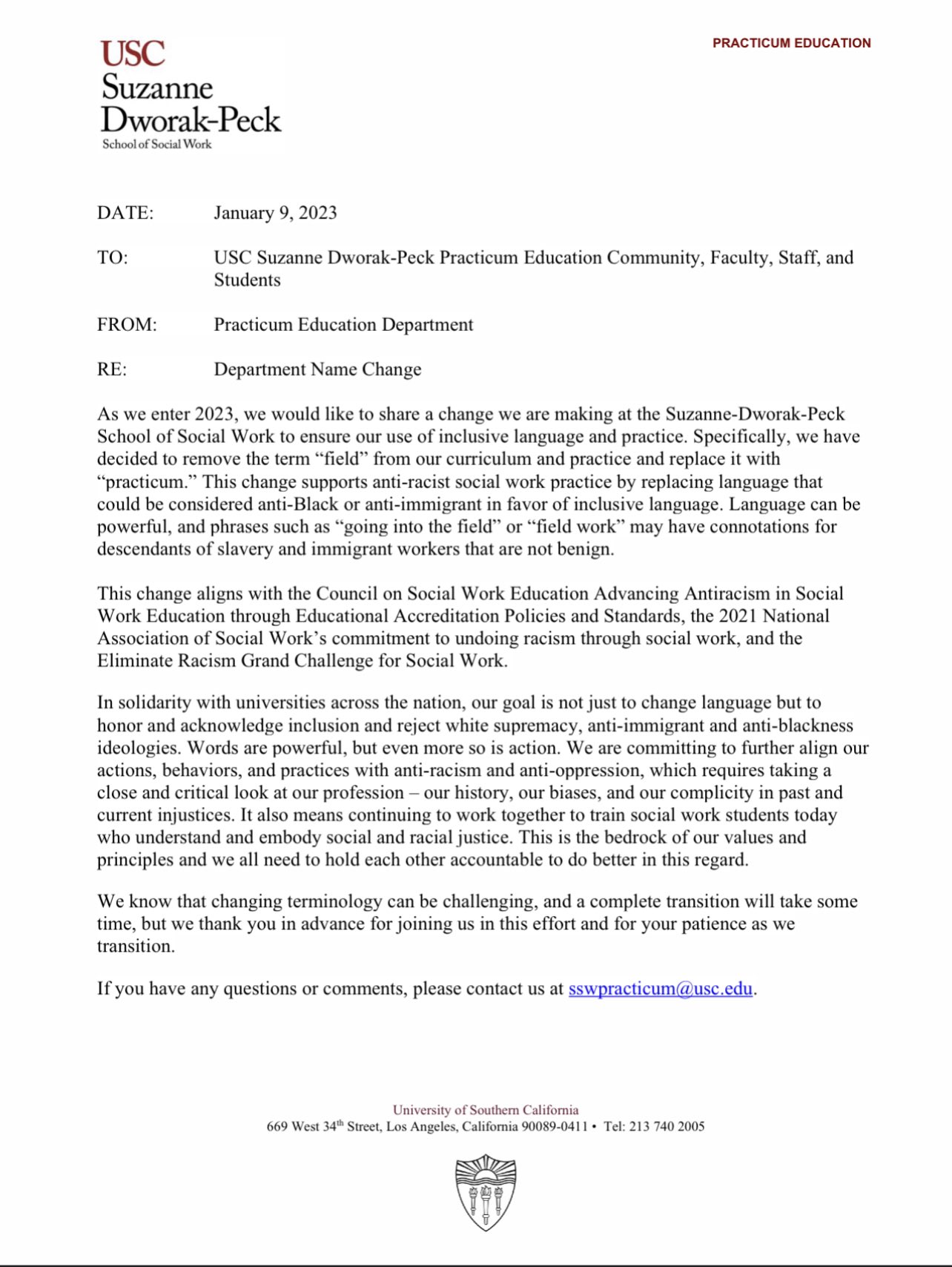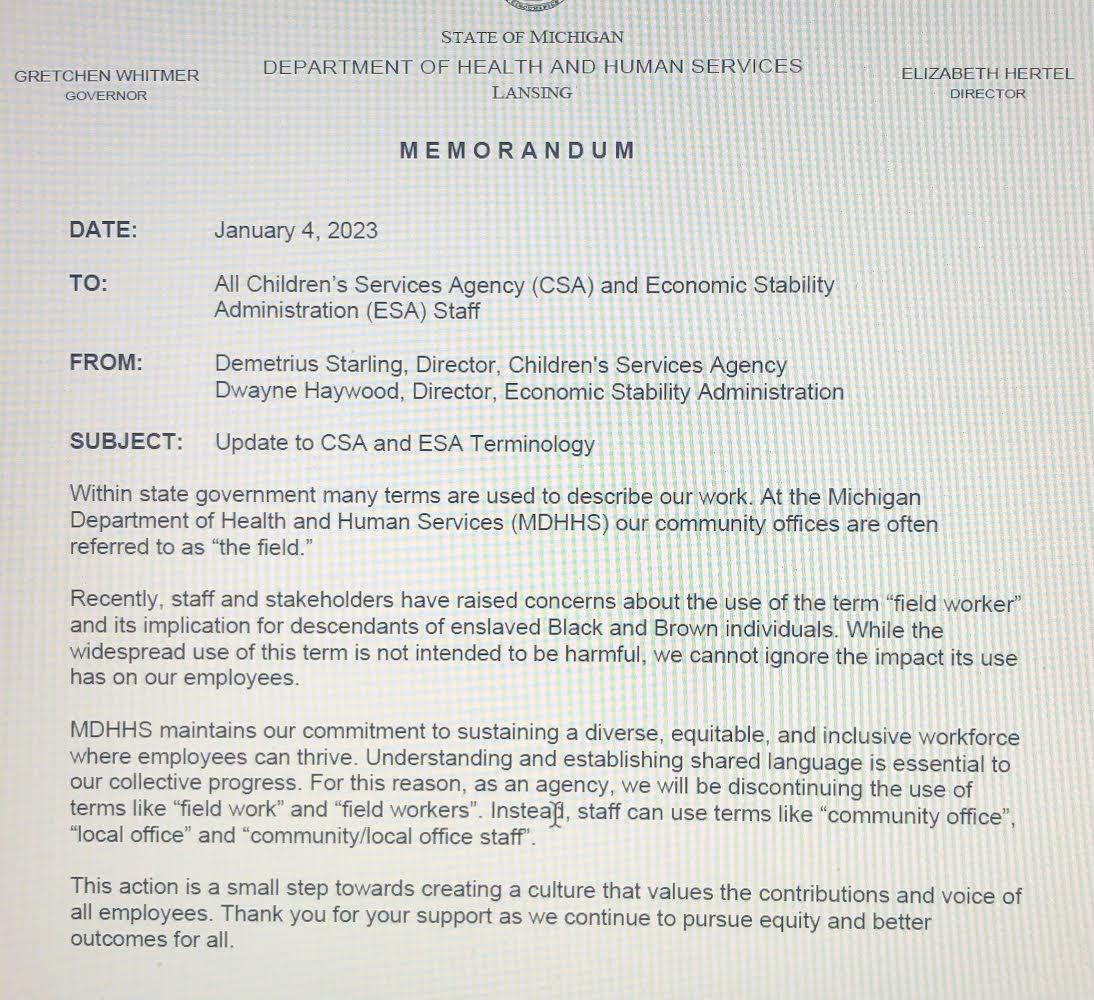Here is something that I think has a decent chance of being what Naulleau was referring to, even though the details differ from the description. It isn't a matter of field being treated as a "trigger word" that lecturers must warn about: rather, it is a memo that was sent when a department changed its name from "Office of Field Education" to "Office of Practicum Education". The use of the word "field" in the context of expressions like "magnetic fields" doesn't seem to be what the memo is about (I suspect that magnetic fields do not have a large place in the curriculum of the USC Suzanne Dworak-Peck School of Social Work).
The memo suggests the use of "field" in the context of phrases like "field education" could be harmful or exclusionary, but does not suggest warning for the word's presence. Rather, it suggests using revised terminology ("practicum education"). This is not directly related to the topic of trigger warnings; it is more similar to arguments about replacing technical terminology like "master-slave" or "whitelist/blacklist" with alternatives that are supposed to be more inclusive.
"A USC office removes 'field' from its curriculum, citing possible racist connotations" (NPR, updated January 14, 2023, by Giulia Heyward)
An office within the University of Southern California's School of Social Work says it is removing the term "field" from its curriculum because it may have racist connotations related to slavery.
The newly renamed Office of Practicum Education, formerly known as the Office of Field Education, within the university's Suzanne-Dworak-Peck School of Social Work, is making the change in order to be more inclusive, according to a memo sent out to faculty and students this week and obtained by NPR.
"This change supports anti-racist social work practice by replacing language that could be considered anti-Black or anti-immigrant in favor of inclusive language," the memo reads. "Language can be powerful, and phrases such as 'going into the field' or 'field work' may have connotations for descendants of slavery and immigrant workers that are not benign."
The article links to a tweet by Houman David Hemmati that gave the text of the letter as follows:

As the article notes, this memo received some public attention, which is why I think it's plausible that the idea of lecturers giving trigger warnings for the word "field" is a garbled reference to this. It seems some other social work programs have also made similar terminological changes; the following blog post mentions Cal State Northridge and Smith College: Knowledge is under attack, and “fieldwork” isn’t the problem (by Philip N. Cohen, May 12, 2023, Family Inequality).
Of course, there's a chance that rather than inaccurately describing this memo, Naulleau is accurately describing some other incident that I'm not aware of. As the comments have mentioned, there is no such thing as a standard list of trigger warnings that all US universities follow; this means that it would definitely be inaccurate to say without qualification that giving trigger warnings for the word "field" is something that US universities do, but it's also difficult to be 100% certain that it has never happened at all in any US university.
For a bit of background on the concept of trigger warnings in higher education, here is another NPR article: "Half Of Professors In NPR Ed Survey Have Used 'Trigger Warnings'" (September 7, 2016, All Things Considered, by Anya Kamenetz). It notes that of the college faculty respondents that reported giving warnings about content in class material, the majority did so as a matter of personal judgement, not at student request or to comply with a policy, and "only 1.8 percent said, as of last fall, that their institutions had any official policies about their use." So keep in mind that professors giving trigger warnings is not only unstandardized and far from universal, but also often not a matter of official university policy. Based on the information in the article, as well as my own experience, I highly doubt that any US university has an official policy that would prevent professors or lecturers from using the phrase "magnetic fields" in instruction, or require them to warn their students about it.
Certainly, no such policy is in place at USC. After the memo became a topic of public discussion, the interim provost and senior vice president for academic affairs, Elizabeth A. Graddy, stated in an email to The Washington Times that
The university does not maintain a list of banned or discouraged words. We will continue to use words – including ‘field’ – that accurately encompass and describe our work and research
("USC to keep using word ‘field’ despite departmental ban over slavery ‘connotations’", Valerie Richardson - The Washington Times - Thursday, January 12, 2023)


